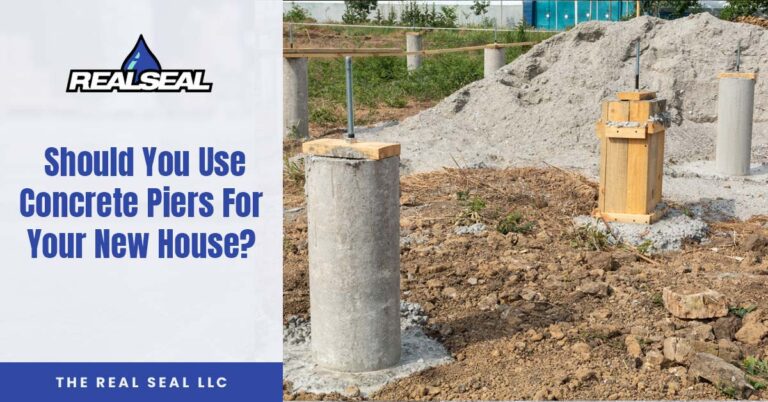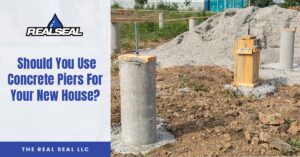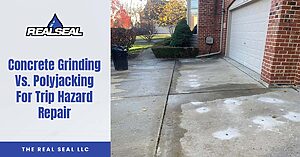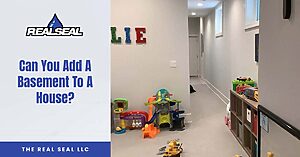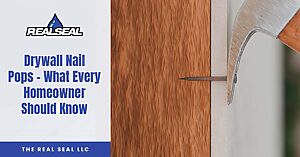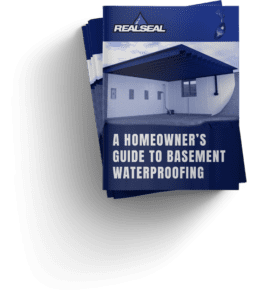Are you wondering if you should use concrete piers for your new house? If so, this is the article for you. In this article, you’ll learn more about one of the most popular foundations for homes across the U.S., including pros, cons, and other insightful information. We’ll also point you in the right direction if your concrete pier foundation ever needs repair or maintenance.
What Are Concrete Piers?
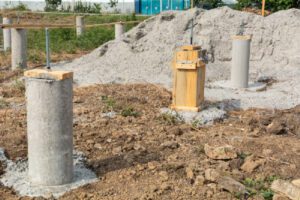
Concrete piers are a type of foundation that elevates your home off the ground. These piers, combined with wooden beams, create the pier and beam foundation system, which is commonly used in homes built on slopes or areas with rising tides. The piers transfer your home’s weight into the soil while the beams are placed across the piers, tying everything together. These foundations are also considered crawl space foundations since they form a space between the ground and your home.
Concrete piers are a subtype of pier foundations. If builders determine there’s soil close enough to the surface to hold your home’s weight, they’ll use concrete piers. If viable soil is deeper than usual, builders will use drilled piers (caissons) instead of solid concrete piers. These piers are drilled into the ground and filled with concrete and reinforcing materials.
Should You Use Concrete Piers For Your New House?
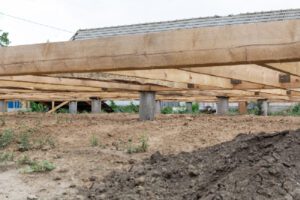
Here are a few different cases where concrete piers are a viable option for a new home.
- If there’s strong soil below a layer of decomposed rocks.
- If the soil contains a lot of stiff and resistant clay.
- If the home is built from log or timber.
- If the home is built on a slope.
- If the soil has a lower water-bearing capacity (the amount of water a given soil can hold).
Now that we’ve discussed cases where concrete piers are used let’s talk about some of their benefits.
- Fewer materials – Since the concrete piers are spaced out from each other under your home, the foundation requires fewer materials.
- Variety – There are a few different types of pier foundations available for builders: concrete piers, concrete blocks, and drilled caissons.
- Adaptability – Contractors can change or add piers even after the foundation and home are finished.
- Less excavation – Since contractors only need to dig holes for each pier, there’s less excavation and disruption than building a basement or pouring a slab.
- Minimal water damage – Since concrete piers elevate your home off the ground, rising water will have a harder time damaging the bottom of your home (we talk about moisture issues further down).
- More access – Like all crawl space foundations, inspectors or contractors can easily access any wires, pipes, and ducts that run under your home. This clearance also allows foundation repair and waterproofing professionals to investigate any signs of moisture buildup or structural damage.
- Less vibration – Because foundation piers transfer the weight of your home into the soil, ground movement will have a harder time vibrating your home.
Things You Should Know If You Use Concrete Piers For Your House

Unfortunately, concrete piers come with a few downsides.
- Sagging and tilting – If one or more concrete piers sink into the soil, you might notice your home sagging in one direction. This can also occur if some of the concrete piers begin to tilt or slope.
- Deterioration – If the concrete piers are poorly built or not well maintained, you might notice them crack or collapse over time.
- Exposure – Like all crawl space foundations, experts always recommend sealing or encapsulating the space below your home to prevent moisture buildup, humidity, mold, and more. Since pier and beam foundations lift your home off the ground, moisture can rise out of the dirt and affect wooden structures, including the beams.
The good news about these downsides is they can be avoided. When they are well maintained, concrete piers can last well beyond the life of your home unless affected by anything extreme, such as a mudslide or earthquake. To prevent moisture issues, crawl space waterproofing experts can line the floors, walls, and piers with an impermeable vapor barrier that will keep moisture from building up under the home. Once you’ve addressed the problems you can control (excluding natural disasters), your concrete piers should last a very long time.
How Much Do Concrete Piers Cost?
Concrete pier foundations usually cost between $15,000 and $30,000. Since concrete piers are built individually, they require more precision and care to ensure nothing goes wrong during construction. Compared to slab foundations, which are harder to maintain and cost between $5,000 and $20,000, concrete pier foundations offer more accessibility, making it easier to care for them as they age.
Who Can Repair Concrete Piers?
As we mentioned above, when well maintained, concrete piers can last well beyond the life of your home. So, if you want someone to inspect your concrete pier foundation or you’ve noticed some common signs of foundation issues, call The Real Seal. Our team of experts have been repairing all types of foundations across Chicagoland and its surrounding suburbs. Once we’ve inspected your concrete piers, we’ll form a foundation repair plan that restores one of the most vital parts of your home. Call today for your free inspection and estimate.
